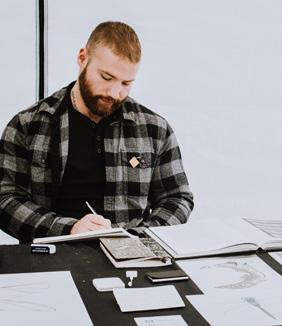LIVING CULTURES
INDIGENOUS ARTIST
HANDLING DIFFICULT CONVERSATIONS
“We all come from a wealth and great people. Don’t let anyone tell you different.” —Kevin Cranmer Working in the public is rewarding, but it can also bring up difficult conversations and topics. You will encounter people from all over the world, from different cultures and with different levels of understanding. Tips for handling difficult conversations: Invite guests to learn more within the cultural site where you are located (e.g., museum galleries or exhibits). You may choose to say something like, “That may be your understanding, but that is not my experience,” which could lead to you sharing your personal perspective. Many will be looking for a reaction; do your best to not give them the rise or debate they are looking for. If the situation escalates, contact your program coordinator, an employee or security. Tips from artists: “Try to be as knowledgeable “In a lot of instances, it comes down to life experiences, as you can—know who you for me. I have experienced racism from when I was five are and where you are from.” years old. As soon as we have learned right from wrong, —Sarah Jim we have had to deal with racism. You see it enough that you can recognize it almost right away—for example, when people are passive aggressive or playing ignorant on purpose. You can either share information or if you “If you begin to feel unsafe, are feeling in that moment the direction that it is going tell the other artists around to go is negative, you can ignore it or you can just walk you. Know that you have away. Take yourself out of the situation to avoid saying support around you.” things you might not want to.” —Sarah Jim —Virgil Sampson
19
Living Cultures: An Empathy-Building Toolkit




